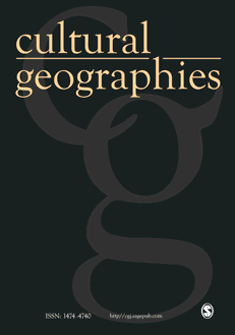
CULTURAL GEOGRAPHIES
Scope & Guideline
Connecting Cultures through Geographical Perspectives
Introduction
Aims and Scopes
- Cultural Narratives and Place-making:
The journal focuses on how cultural narratives shape and are shaped by geographical spaces, exploring the dynamics of identity, memory, and belonging in various contexts. - Creative and Artistic Methodologies:
It promotes the use of creative methodologies, including art, performance, and digital practices, as tools for research and expression within cultural geography. - More-than-Human Geographies:
The exploration of non-human agency and the relationships between humans and other species is a significant area of interest, emphasizing ecological and multispecies perspectives. - Decolonial and Critical Geographies:
CULTURAL GEOGRAPHIES addresses issues of power, colonialism, and resistance, engaging with decolonial theories to critique traditional geographical narratives and practices. - Affective and Emotional Geographies:
The journal investigates the role of affect and emotion in shaping human experiences of place, considering how these factors influence social dynamics and cultural practices. - Digital and Mediated Geographies:
It examines the impact of digital technologies and media on cultural geographies, exploring how these tools transform our understanding of space and community.
Trending and Emerging
- Affective and Emotional Geographies:
Recent publications increasingly explore the emotional dimensions of geography, focusing on how feelings, memories, and affective ties shape human experiences of place. - Digital and Technological Interactions:
There is a growing interest in how digital technologies and social media influence cultural practices and spatial perceptions, reflecting the journal's adaptation to the digital age. - Ecological and Environmental Perspectives:
Emerging themes focus on ecological consciousness and environmental justice, emphasizing the interconnectedness of cultural practices and ecological sustainability. - Multispecies and More-than-Human Studies:
A notable trend is the exploration of multispecies relationships, highlighting the agency of non-human actors and the complexities of human-environment interactions. - Decolonial and Anti-Colonial Frameworks:
The journal is increasingly engaging with decolonial theories and practices, reflecting a commitment to challenging colonial narratives and promoting diverse epistemologies. - Participatory and Community-based Research:
There is an emphasis on participatory methodologies that involve communities in the research process, fostering collaborative practices and local knowledge production.
Declining or Waning
- Traditional Geographic Methodologies:
There is a noticeable decline in the use of conventional geographic methodologies, such as quantitative analysis and statistical approaches, as the journal increasingly favors qualitative and creative methods. - Historical Geographies of Place:
While historical perspectives have been significant in earlier issues, recent publications show a reduced emphasis on historical geographies, indicating a shift towards contemporary cultural issues. - Fixed Notions of Space and Identity:
The journal appears to be moving away from static definitions of space and identity, focusing instead on fluid, dynamic interactions and relationships that challenge traditional boundaries. - Eurocentric Perspectives:
There is a waning interest in Eurocentric frameworks, as the journal increasingly embraces diverse and global perspectives that reflect a broader range of cultural experiences. - Purely Academic Discourse:
While theoretical contributions remain important, there is a decline in purely academic discourse, with a growing preference for applied research that engages with real-world issues through creative practices.
Similar Journals
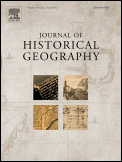
JOURNAL OF HISTORICAL GEOGRAPHY
Bridging History and Geography Through Innovative ResearchWelcome to the Journal of Historical Geography, an esteemed publication dedicated to enriching the fields of archaeology, geography, and history through innovative research and critical discourse. Published by Academic Press Ltd - Elsevier Science Ltd, this journal has been a cornerstone of interdisciplinary scholarship since its inception in 1975, now extending its coverage through 2024. With an impressive Scopus ranking that places it in the top quartile for history and strong standings in archaeology and geography, this journal offers insightful analyses that are crucial for understanding spatial dynamics over time. Researchers and professionals alike value its commitment to accessibility and rigor, making it an essential resource for academics engaged in the study and teaching of historical geography. Although the journal operates under subscription access options, its contributions undoubtedly enrich scholarly dialogue and foster a deeper understanding of our historical landscapes.
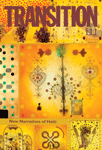
Transition
Unraveling the Threads of Social TransitionTransition is a distinguished academic journal published by Indiana University Press and is essential in the interdisciplinary field of cultural studies and social transformation. With an ISSN of 0041-1191 and an E-ISSN of 1527-8042, this journal publishes insightful research and critical analyses that explore themes of identity, community, and change in contemporary contexts. Although currently not categorized as an open access publication, its contributions to understanding the dynamics of transition and its profound impact within society make it a valuable resource for researchers, professionals, and students alike. By fostering dialogues that traverse various genres and academic disciplines, Transition remains at the forefront of scholarly discourse, attracting a global audience and contributing under the rigorous standards of a reputable academic community.

Geohumanities
Mapping Cultural Insights in a Changing WorldGeohumanities is a leading journal dedicated to exploring the dynamic intersections between geography and the humanities. Published by Taylor & Francis Ltd, this interdisciplinary journal serves as a platform for innovative research that unravels the spatial dimensions of human culture and experiences. With an impact factor reflective of its robust academic reception, the journal is classified within the Q2 quartile across several categories, including Arts and Humanities, Geography, and Social Sciences, evidencing its significance in contemporary scholarly discourse. Since its inception in 2019, Geohumanities has aimed to foster dialogue between diverse disciplinary perspectives, enhancing the understanding of social, cultural, and environmental issues through a geographical lens. As it prepares for 2024 and beyond, the journal invites researchers, professionals, and students to contribute their findings and insights, making it an essential resource for anyone interested in the humanities within geographical contexts. For access options and more details, please visit the journal's webpage.
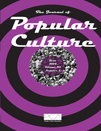
JOURNAL OF POPULAR CULTURE
Decoding the Impact of Culture on SocietyThe Journal of Popular Culture, published by Wiley, stands as a pivotal platform for the exploration and analysis of cultural phenomena since its inception in 1967. With its ISSN 0022-3840 and E-ISSN 1540-5931, the journal deeply engages with themes encompassing literature, history, and the broader arts and humanities landscape, further categorized in 2023 into distinct quartiles reflected by its superior rankings: Q3 in Arts and Humanities (miscellaneous), Q2 in History, and Q1 in Literature and Literary Theory. This journal not only ranks competitively in Scopus—positioned at the 73rd percentile in Literature and Literary Theory and achieving a significant recognition in History—but also cultivates a rich dialogue aimed at researchers, educators, and students alike. Through its non-open access model, the journal maintains a robust collection of scholarly articles that contribute to the understanding of popular culture's impact on society, making it an essential resource for academics and practitioners committed to this dynamic field.

Versus-Quaderni di Studi Semiotici
Exploring the Intersections of Semiotics and PhilosophyVersus-Quaderni di Studi Semiotici, published by SOC ED IL MULINO, is a distinguished scholarly journal based in Italy, focusing on the interdisciplinary fields of semiotics, linguistics, and philosophy. With its ISSN 0393-8255 and E-ISSN matching, the journal has gained recognition for its rigorous academic contributions, achieving notable rankings in the 2023 category quartiles, including Q2 in both Linguistics and Language as well as Philosophy, and Q4 in Applied Psychology. With an aim to foster innovative discourse and critical analysis, Versus serves as an invaluable resource for researchers, professionals, and students alike, facilitating an exchange of ideas that challenge conventional paradigms across these interconnected disciplines. Despite its lack of open access, the journal's singular commitment to intellectual rigor and its pivotal role in shaping semiotic studies make it a key player in the academic landscape. The publication period converges from 2019 to 2024, ensuring that its readers remain at the forefront of contemporary semiotic inquiry.
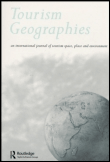
Tourism Geographies
Innovating Insights for a Sustainable Tourism FutureTourism Geographies is a leading academic journal published by ROUTLEDGE JOURNALS, TAYLOR & FRANCIS LTD, specializing in the diverse and dynamic field of tourism studies. With a Focus on the intersections of geography, planning, and development, this journal has established itself as an authoritative source for innovative research and insights since its inception in 1999. The journal not only holds a prestigious Q1 rank in both the categories of Geography, Planning and Development and Tourism, Leisure and Hospitality Management but also boasts remarkable rankings in Scopus, reflecting its impact and relevance in the academic community. With years of knowledge converging till 2024, Tourism Geographies provides critical perspectives and findings that contribute to the sustainable development of tourism practices worldwide. Researchers, professionals, and students engaged in tourism and related fields will find this journal to be an invaluable resource for advancing their understanding and shaping future policies within the industry.
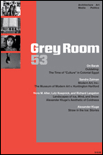
Grey Room
Unveiling Cultural Narratives Through Built EnvironmentsGrey Room is a distinguished peer-reviewed academic journal published by MIT Press, focusing on interdisciplinary discussions at the intersection of architecture, communication, sociology, political science, and the visual and performing arts. Established in 2002, the journal has carved out a critical space for exploring the links between built environments and cultural narratives, engaging a diverse readership of researchers, professionals, and students. With an impact factor reflecting its contribution to these fields, it is recognized for fostering innovative dialogue and scholarship. Although it operates without an open access model, Grey Room continues to thrive in the academic community, particularly as it moves towards converged years spanning from 2002 to 2024. The journal's categorization into various quartiles highlights its relevance and ongoing commitment to contemporary issues. Readers can expect thought-provoking articles that challenge conventional boundaries of practice and scholarship, making Grey Room an essential resource for those interested in the dynamic interplay of architecture and culture.
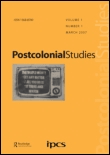
Postcolonial Studies
Engaging with the past to understand the present.Postcolonial Studies, an esteemed journal published by Routledge Journals, Taylor & Francis Ltd, serves as a leading forum for scholarly contributions in the fields of history and political science. With an impressive 2023 impact factor reflected in its Q1 ranking in History and Q2 in Political Science and International Relations, this journal is pivotal for researchers and professionals engaging with the intricate legacies of colonialism and its ongoing impact on contemporary societies. Established in 2010, the journal encompasses a wide array of interdisciplinary perspectives, fostering dialogue and critical analysis on issues of power, identity, and cultural representation. As an essential resource for scholars and students alike, Postcolonial Studies aims to illuminate diverse voices and narratives, contributing to a deeper understanding of postcolonial conditions and their implications globally.

Aisthesis-Pratiche Linguaggi e Saperi dell Estetico
Exploring the Intersection of Aesthetics and KnowledgeAisthesis-Pratiche Linguaggi e Saperi dell Estetico is a distinguished journal published by FIRENZE UNIV PRESS, dedicated to the exploration of aesthetics and its intersection with language, knowledge, and practices in the arts. Since its inception, the journal has embraced an Open Access model, facilitating widespread dissemination of research since 2008, appealing to a global audience and fostering an inclusive academic dialogue. With a focus spanning across Philosophy, Visual Arts, and Performing Arts, it has established itself as a significant contribution to the field, achieving a Q3 categorization in both Philosophy and Visual Arts and Performing Arts as of 2023. Ranked comfortably within the Scopus indexing, the journal currently sits at Rank #305 in Visual Arts and Performing Arts and Rank #475 in Philosophy, reflecting its growing influence. The converged years from 2017 to 2023 mark a period of robust scholarly engagement and innovative contributions. For researchers, professionals, and students alike, Aisthesis remains a vital resource for contemporary discourse in aesthetics and an essential platform for the exchange of ideas.
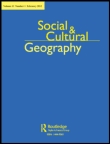
SOCIAL & CULTURAL GEOGRAPHY
Fostering critical perspectives on societal spaces.SOCIAL & CULTURAL GEOGRAPHY, published by Routledge Journals, Taylor & Francis Ltd, stands as a leading platform for innovative research in the fields of cultural studies and geography. With an impressive impact factor reflected in its Q1 ranking in both Cultural Studies and Geography, Planning and Development categories, this journal houses high-quality articles and theoretical frameworks that shape contemporary discussions in social and cultural geography. Its rigorous indexing, including a commendable Scopus Rank—#20 out of 1304 in Cultural Studies—underscores its significance and influence in the academic community. Operating since 2000 and continuing to thrive until 2024, SOCIAL & CULTURAL GEOGRAPHY promotes interdisciplinary dialogues while fostering a deeper understanding of the intricate relationships between society and space. We encourage researchers, professionals, and students to engage with resourceful insights and critical perspectives published in this pivotal journal, thereby contributing to the evolving landscape of geographical thought.